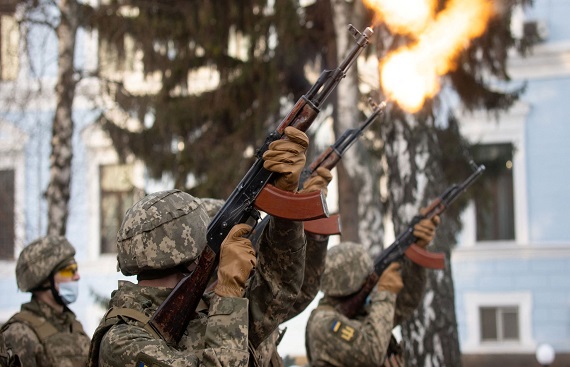How will Russia-Ukraine Crisis impact India's economy?

After signalling a morose end to Pax Americana, Russian President Vladimir Putin announced a military operation in Ukraine today early morning. The Ukrainian foreign minister termed it a "full-scale invasion".
Global markets responded in kind to the ‘demilitarisation and denazification’ of Ukraine by Russia, with significant indices across the world trading in a deep sea of red. At the same time, gold hit the highest since early 2021. And just as the world started regaining from the damage caused by the Covid-19 pandemic, worries have set in yet again, globally, about trouble in the face of already rising cost pressures and rolling back of pandemic-era estimates by the central banks. However, the ongoing tensions have impacted global diplomacy, economy, markets, and politics worldwide.
US President Joe Biden has named Putin’s move “an unprovoked and unjustified attack by Russian military forces” and said the “world will hold Russia accountable.” The US & its allies, over the past few days, had reacted to the imminent invasion of Ukraine by imposing sanctions on Russia, with severe ones incoming.
What does this invasion of Ukraine possibly mean for India?
![]()
The most significant macro risk for India is a recovery in crude prices. The rise in crude prices poses inflationary, fiscal, and external sector risks as crude oil-related products have a direct share of over 9 per cent in the WPI basket. It may force the Reserve Bank of India to abandon its accommodative monetary stance.
Equity markets have whipped while crude oil prices have shot up to triple digits a barrel.
Considering India imports more than 80% of its oil requirements, the development is the major drawdown.
Besides, the Russia-Ukraine crisis has created a huge impact on Indian households and policymakers. Ukraine and Russia together account for 90% of India’s sunflower oil imports.
Following this, Indian markets were the worst hit among other Asian markets. The market capitalisation of BSE listed companies got slashed by $103 billion in the first hour of trade.
The news of a full-blown war has badly hit equity markets that were already reeling for reasons like relentless FII selling, the expectation of a fall in interest rates, high fuel prices and rising inflation.
What Industry Experts Say on Market Fall?
Vijay Chandok - MD & CEO, ICICI Securities, said the escalated war situation between Russia/Ukraine has led to a sharp cut in key equities across the globe; we believe crude trajectory will be the key to watch out for going forward. We don’t expect major sanctions, which may drive a big spike in crude, equally harming Europe and the US, or even in terms of aggressive rate hike leading to slower economic growth. We, thus, believe that market stabilization is likely in the short term. Nonetheless, the medium to long term thesis on Indian equities remains intact amid economic recovery as reflected by key macroeconomic indicators, strong capex spending and robust corporate earnings (Nifty earnings growth likely at 21.5 % CAGR over FY21-24). We continue to see this correction as an opportunity for the investors to add on the companies with sustainable growth visibility.
Naveen Kulkarni, Chief Investment Officer, Axis Securities, said Geopolitical events often come up with short-term responses in the market as the dominant news flow directs to market volatility. The current Russia-Ukraine crisis would lead to a rise in oil prices, higher than the current levels. High crude prices could delay the cool-off in inflation, which was anticipated to go moderate by the second half of 2022.
We believe the current macroeconomic developments lead to volatility in all major asset classes, including equity and debt. The volatility is here to remain for some time before we conclude a market direction.
Investors should focus on asset allocation and use this volatility to build long-term positions in quality large and mid-cap stocks as they become attractive after the current correction and provide a good entry point.
Amar Ambani, Head of Institutional Equities, YES Securities, said the geopolitical event has been causing a rout across equity markets, as the world can ill-afford further disruption in trade and commodities when Covid has already weakened sovereign balance sheets. History has shown us that these wars offer good entry points for investors. We had opined a few days ago that post the meteoric rise to 18,000 on the Nifty from lows of 7,500, it seemed like the Nifty could correct to 15,800 levels. We were already witnessing the consolidation since mid-October 2021 due to a lack of fresh triggers. The Russia-Ukraine issue added a negative trigger to the existing overhang of the US Fed, likely raising rates in March 2022. However, we reiterate our bullish stance on Indian equities for the next three years. The next 7-odd trading sessions will offer tremendous opportunities for the long-term investor. Invest in good quality management in sunrise sectors.
